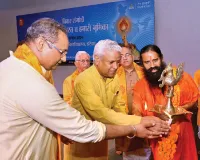According to the Gita What’s Karmayog?
On

Dr Acharya Sadhvi Devapriya
Woman Chief Central Incharge
Patanjali Yog Samiti
Karm-yog’ is Gita’s own independent word. The Gita has provided a gift to the thought of world. Due to ‘karm-yog’, the Gita is still providing fresh message to the world as it had given to Arjuna who was disappointed at the battle field of Kurukshetra. Everybody in the life is Arjuna. Everybody has to face tough time in his/her life. Everybody started to cry by throwing weapons in the odd situation. Arjuna faced the enemies in the battle field by listening discourse of karm-yog which can also shed disappointment in us. Now question arises that the karm-yog which gave new lease of life to the disappointed people, turned feared people into bold ones and made karm-sanyasi to karm-yogi. What’s this? Let’s ponder over the obstacles coming on the path of becoming karmyogi.
Tamoguni says that he will do his duty after getting result. Rajoguni says that he will do his duty but at the same time he will possess the result. The perception of satvaguni people is similar to that of karmyog. It is the coordination of both the perceptions. In this, duty is not left like tamoguni and result is not possessed like rajoguni. This path of karmyog is called ‘nishkam-karm’. According to the Gita, the intellectual persons must do their duty by leaving their infatuation to the result. Do we not see that we can our duty, while we have no authority on the result. We do farming and the produce gets dried due to scanty rain. It gets affected due to thunderstorm, calamity, etc. We have no control over the result. We can do our duty and the result is beyond our control. Then why do we waste our energy on the longing for result? The Gita gives inspiration to us for accepting the facts. According to which, not aiming at the result while doing our duty is realistic outlook. Because despite longing for result, I have no right on it. ‘Karm-yog’ means having no longing for result, at the same time, it doesn’t mean that we leave hope for result. The meaning of ‘karm-yog’ is not leaving hope for result, but relinquishing possession on result, longing and attachment. The result of nishkam-karm is 100 times greater than that of sakam-karm, but they don’t consider their possession on it. According to Acharya Vinoba Bhave, nishkam-karm itself is result, therefore they don’t aim at other result. Why is nishkam-karm result? When the artist makes picture and if somebody asks him not to do it, whatever money you want, I will give you, then will he leave the idea of making the picture? If the poet is asked not to write poems and take money for it, then will he leave the idea of writing poems? The artist makes picture, the poet writes poem. They consider it their duty. They have no longing for result. They make picture for picture and write poem for poem. They are engaged in their duty as the sun continue to provide light to the world, the moon continue to make night lovely, the sky continue to shower rain and the air continue to give breath to the people. Such type of niskam karm has no comparison with sakam-karm.
‘Sarvabhutahite ratah’—it means that to consider all the animals as their own and engage in the welfare of others instead o their own. Those who see the God everywhere will see only one element everywhere. He will ready to remove sorrow and diseases of other people because he considers pain of other people as his own.
Karmnyevadhikaraste ma phaleshu kadachan I
Ma karmaphalaheturbhurma te sadgoastvakarmani II Gita 2.47 II
It’s your right to do your duty instead of leaving it. You have no right on result despite doing your duty. He must leave longing for result. While doing so, you won’t become the means of result, because duty being done with longing for result becomes the means for binding karmphal.
Yogasthah kuru karmani sadagan
tyaktva dhananjaya I
Siddhiyasiddiyoh samo bhutva samatvam yog uchyate II Gita 2.48 II
Duren hvavaram karm
buddhiyogaddhananjaya I
Buddhau sharanamnvichchha kripanah phalahetavah II Gita 2.49 II
Oh Dhananjay ! Leave the materialism and subjects and do yog it means that do your duty by considering siddhi or asiddhi as equal. Remaining calm in case of either success or failure is called yog because the condition of sakam karm in comparison to nishkam karm is trivial. Therefore, oh Dhananjay! Meet the samatvabuddhi people because those who aim at result while doing duty becomes poor.
Lord Shrikrishna has clearly said to Arjuna that you have the right to do your duty. Those who do their duty will certainly get desired result. But after doing duty, there are various types of causes in the consideration of result. It’s uncertain that he will get desired result. Therefore, don’t infatuate with result and do your duty by aiming at result because in that case poverty will envelop.
Buddhiyukto jahatih ubhe sukritadushkrite I
Tasmaddogay yujyasva yogah karmasu kaushalam II Gita 2.50 II
The intelligent people remain untouched with virtue and sin in this world. It means that he gets emancipated from it. Therefore, do yog because it’s wise step towards doing duty. Due to which, even duty binding people too become free.
Na prahvshyetiprayam prapya
nodvijetprapya chapriyam I
Isthirabuddhirasammuddhe brahmvid brahmani isthitah II Gita 5.20 II
Those who don’t become joyous after getting their desired result and become disappointed after getting bad result remain in the equilibrium by becoming stable, clear minded, etc.
Anashritah karmphalam
karyam karm karoti yah I
Sa sanyasi cha yogi ch na niragnirna
chakriyah II Gita 6.1 II
Those who do their duty without aiming at result are sanyasi and yogi. Those who relinquish only agnihotra are not sanyasi and those who leave activities are not yogi.
Jitatmanah prashantasya
parmatma samahitah I
Shitoshnasukhaduhkheshu tatha manapamanayoh II Gita 6.7 II
Those who have won their soul means mind and intellect and got peace remain the same even in respect-disrespect, pain-prosperity, warm-cold. It means that they remain in equilibrium.
Yuktaharaviharasya
yuktacheshtasya karmasu I
Yuktasvapnavabodhasya yogo bhavati
dukhaha II Gita 6.17 II
Those who consume balanced and aesthetic diets and remain calm get the result of this yog. It lessens their pain.
लेखक
Related Posts
Latest News
01 Dec 2024 18:59:48
योग प्रज्ञा योग - योग जीवन का प्रयोजन, उपयोगिता, उपलब्धि, साधन-साधना-साध्य, सिद्धान्त, कत्र्तव्य, मंतव्य, गंतव्य, लक्ष्य, संकल्प, सिद्धि, कर्म धर्म,...




.jpg)










.jpg)


1.jpg)
.jpg)
